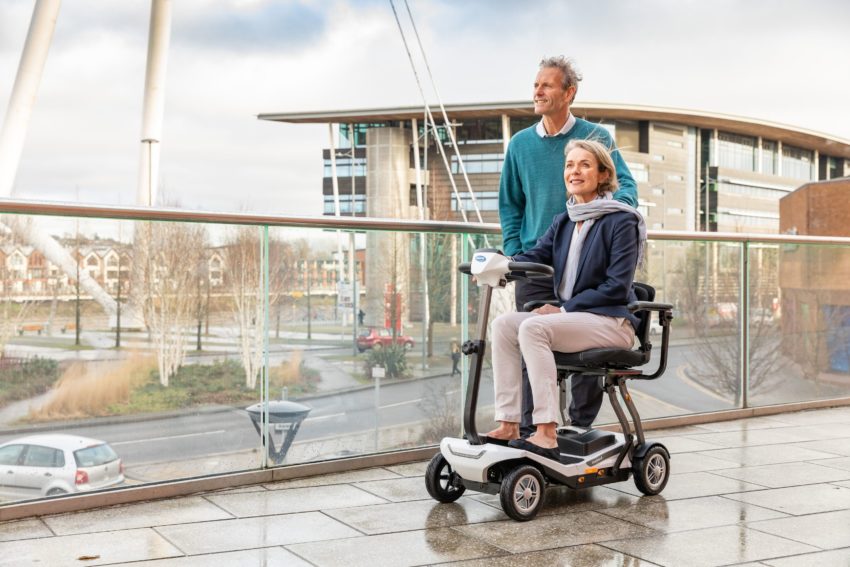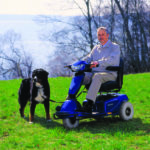Mobility Scooter Motor Maintenance: Some Useful Tips

Mobility scooters enable people to maintain their independence and help those with mobility challenges to maintain their lifestyle. This is just one of the reasons why they have become so popular and have become a much more regular feature in our communities.
Indeed, mobility scooters have lately become much more than just one of many mobility options for people with disabilities and the elderly. They’ve transformed into a ‘weapon of choice’ for many, a perfect tool to navigate busy urban surroundings and tight schedules in an environment-friendly, affordable, comfortable and practical way.
However there are considerations for people who own or are thinking about purchasing scooters with regards to maintaining the mobility scooter motor:
Although the technology around Mobility scooter motors has moved on considerably within the last 10 years, particularly their robustness and design, owners or future owners need to be aware of the basic maintenance requirements to keep their Mobility scooter motors running and in prime condition.
By following these tips the user should be able to enjoy many years of use of your Mobility scooter.
Here is a rundown on things you would need to check or need to consider if you already own or think about before buying your own mobility scooter:
- Always check your manufacturer’s maintenance instructions. This will have a list of basic do’s and don’ts particularly around the safe use of your Mobility scooter.
Batteries
Batteries are a vital part of any electric propulsion system, and mobility scooters are no exception to this rule. To make sure your mobility scooter motor is in optimal driving condition, always check the section in your user manual describing battery maintenance. Acid batteries need to be kept dry and clean. Gel batteries as above.
- Charge your scooter batteries regularly.
- Batteries can be affected by low temperatures, so be sure to store them accordingly.
- Batteries lose their capacity to hold charge over time depending on the use and daily maintenance. Always check your battery indicator before using your mobility scooter
For additional information on mobility scooter batteries, their maintenance, and best practices on prolonging your scooter battery lifespan, read the article focusing on just that.
Cleaning & damage
The fact that keeping your mobility scooter clean is a good idea should come as no surprise. Cleaning your mobility scooter regularly prevents dirt and grit building up and potentially entering and damaging the moving parts of your scooter, such as the brakes or the mobility scooter motors. It can also prevent rust. What it can also prevent are unnecessary health problems. Dust, dirt and grit are not good for anyone – not for you nor for your mobility scooter.
Storage
Cover your mobility scooter motor when not in use.
Store your mobility scooter motor in a dry, clean and secure area. If you don’t own a garage or a shed, store it in your house or apartment.
As is stated above in the Batteries section, scooters should always be covered when not in use to protect them from low temperatures and prevent corrosion. Low temperatures can affect batteries as can high temperatures, which can affect the overall lifespan of your battery.
General checks
Underside may be the hardest to reach and see part of your mobility scooter, but it may well be the one part importance of which is the easiest to overlook. Therefore, check the underside of your mobility scooter regularly for damage, or trapped debris, as it may cause further and much more serious damage if left unchecked, including damage to your mobility scooter motor.
Check for any loose screws. Loose screws not only weaken the structural integrity of your mobility scooter, making it less safe and easy to operate and drive, they can also fall out completely, furthering the risk of injury or more severe mobility scooter damage.
Check tyres for damage – both solid and pneumatic tyres can be damaged. Pneumatic tyre damage may lead to avoidable punctures, and solid tyre damage can cause problems with mobility scooter maneuverability and handling, and driving comfort.
Check indicators and lights. You’re driving your mobility scooter in traffic. Be it a busy sidewalk crowded with pedestrians or a side of a minor road, your lights and indicators are just as important as any other traffic and vehicle signalization, like the one found on bicycles and cars. Damaged and faulty lights are a danger to yourself, as well as everyone else around you.
Servicing
Since we’ve already drawn comparisons to bicycles and cars, there is one comparison that can’t be accented enough. Servicing your mobility scooter is something that must be done regularly, and yet, it’s seldomly taken as seriously as servicing one’s car.
Mobility scooters have moving parts and safety parts such as brakes, and enclosed mechanics, like the electric mobility scooter motor. These need to be checked and serviced by a trained person.
Most manufacturers recommend a yearly service. This also may be stipulated as part of your insurance agreement, but if it’s not, make sure to arrange for a trained serviceman to regularly check your mobility scooter.
Conclusion
Follow the simple steps outlined in this brief article to improve the lifespan of your mobility scooter, and safely and carelessly enjoy the independence it can bring for a long time.
We focused primarily on mobility scooter motors, possibly the most important and delicate part of your scooter, but many of the points addressed here apply to most parts of your vehicle – many of the things that can cause damage to electric motors can do so to brakes, tyres, lights, batteries and anything else, too. And with proper maintenance, including regular checks and service plans, most of the risks and possible damage can be significantly reduced.
Last, but not least – always check your manufacturer’s maintenance instructions. This will have a list of basic do’s and don’ts, particularly around the safe use of your mobility scooter.







